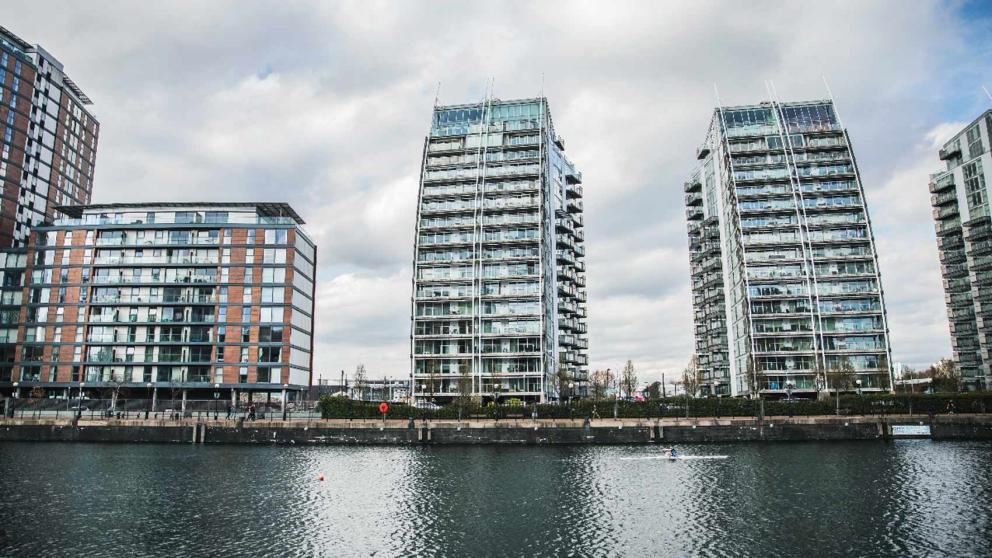
Real Estate and Property Management
Full-time
Part-time
Distance Learning
One year
Two and a half year
32 month
September 2026
In a nutshell
Despite challenging global conditions, the enduring appeal of real estate continues. If you're considering a career move into property, our MSc Real Estate and Property Management postgraduate course can provide you with the knowledge for career success.
Accredited by the Royal Institution of Chartered Surveyors (RICS), our postgraduate degree is ideal for graduates and professionals from a broad range of backgrounds to build relevant real estate and property-focused knowledge and skills.
Led by experienced built environment academics and practitioners, and using advanced software tools and techniques, you will explore how to value and manage urban land and buildings in public and private ownership. You will consider environmental considerations of development and management, and examine technologies driving change.
Award-winning research you’ll learn from
University of Salford has won a prestigious Queen Elizabeth Prize for Education for its world-leading work in sustainable housing and energy efficiency. Through Energy House Labs, students benefit from teaching shaped by cutting-edge research that is helping to reduce energy costs, tackle fuel poverty and design low-carbon homes for the future.
The Queen Elizabeth Prizes for Education form part of the UK national honours system, recognising outstanding contributions by universities and colleges whose work delivers significant societal, economic and global benefit.
International applicant? Please check international intakes for the latest information and application dates.
Start your MSc Real Estate and Property Management study journey
Register for our next Open Day where you can learn more about the course, tour our campus and meet the tutors
You will:
- Learn about the workings of the commercial property market and its relevance to national and international financial and investment markets
- Develop analytical skill as you study advanced current investment and appraisal techniques
- Gain a solid understanding of legal, economic, planning, technical and facilities management factors in property management decision making
- Appreciate the environmental considerations of real estate development and management
students accepted
Course accreditations

This is for you if...
You're new to the commercial property sector and looking to develop a career
You're an established property professional who wants to formalise your real estate and property management skills with an accredited qualification
You're excited by the property sector and have the determination to take on new challenges
All about the course
Course delivery
Our Real Estate and Property Management postgraduate degree course comprises eight carefully-designed modules plus one research-based dissertation project.
The 180-credit MSc award comprises eight taught modules plus the dissertation. The 120-credit PgDip comprises eight taught modules. The 60-credit PgCert award comprises four specified taught modules. We offer course entry each January and September.
Flexibility is at the heart of our learning approach. You can choose to study this postgraduate course full-time or part-time on campus or via distance learning:
- As a campus-based full-time student, you will complete four 15-credit taught modules in each of the first two trimesters. You will complete a 60-credit dissertation in the final trimester
- As a campus-based part-time student, you will complete two 15-credit modules in each of the first four trimesters. You will complete a 60-credit dissertation across two additional trimesters
- As a distance learning student, you can choose to study at the same pace as either the full-time or part-time pathway
The course timetable is designed to allow students with other commitments to structure their week around teaching sessions.
Learning experience
If you are studying on campus, you can take advantage of our proximity to Manchester city centre and visit live developments. Distance learning students will also experience our Collaborate Ultra virtual learning environment, supported by real-time and on-demand interactive sessions. Module assessment is driven by real-world problems aligned to your workplace or role.
Alongside gaining a strong understanding of real estate and property, you will develop your knowledge in topics such as building technology, valuation, legal frameworks and asset management. You will also strengthen your research and analytical skills by completing a dissertation on a topic of your choice. Learn more about the current course modules in the section below.
Course team
The Real Estate and Property Management postgraduate programme is delivered by an academic team with extensive research and subject knowledge. The team is part of a global built environment community with prominence in shaping construction industry best practice.
Course leader: Kevin Aspin
Valuation 1 (15 credits)
Gain the fundamentals for all aspects of real estate valuation covering valuation calculations and methodology to the RICS Guidance and mandatory applications.
Valuation 2 (15 credits)
Continue to learn the fundamentals for all aspects of real estate valuation covering valuation calculations and methodology to the RICS Guidance and mandatory applications.
Building Law Principles (15 credits)
In this module, you'll explore topics related to building law principles:
- Principles of contract law
- Introduction to building contracts
- Negligence & the duty of care
- Occupiers’ liability & building defects
- The land-related torts
- Introduction to commercial leases
Property and Asset Management (15 credits)
Learn about business lease covenants, particularly repairing obligations, service charges, user, alterations & improvements, assignment & sub-letting, rent and rent review.
You will also learn about enforcement and remedies for breach of covenant, and lease renewal within & outside the Landlord and Tenant Act 1954 (Part II).
Statutory Valuation
This module explores the elements of the various areas of Statutory Valuation. The application of legislation to valuation scenarios in compulsory purchase, rating and leasehold enfranchisement will be studied in some detail. The relationship between statutory provision, conventional valuation and practical implementation is examined. The various elements of statutory valuation are taught as individual components within the module with emphasis drawn on the synergy between the various valuation techniques.
Plan Making for Place Shaping
In this module, you will develop an understanding of the planning policy framework, the different types of plans, development management and enforcement process. You will also explore the concept of placemaking for urban design, regeneration and conservation.
Property Development (15 credits)
Learn about the evaluation of land for development potential, the residual method of valuation, sensitivity analysis, development viability, discounted cash flows and calculating the internal rate of return.
Building Efficiency and Pathology (15 credits)
In this module, you will explore space utilisation, facilities management, recognising defects in buildings in different categories and the correction methods.
Dissertation
Module assessments
Trimester 1 (September - January)
-
Critically Exploring Professional Practice [30 points]
*Written presentation (70%)
*Oral presentation (30%)
-
Research Methods [30 points]
*5,000-word paper (100%)
Trimester 2 (January - May)
-
Evidence-Based Practice for Patient Care [30 points]
*Written presentation (70%)
*Oral presentation (30%)
-
Work Based Learning: Independent Learning [30 points]
*To be advised
Trimester 3
-
Dissertation [60 points]
*15,000-word dissertation (100%)
We take a flexible approach to our course delivery that promotes diversity and inclusivity and provides a blended learning experience, which will vary to meet specific programme requirements. This learning time includes formal lectures and interactive activities such as seminars, tutorials, practical sessions, laboratory and studio learning. Smaller classes may be used to support collaborative activities such as project and group work and presentations. A range of different assessments and feedback is offered to meet the needs of both our diverse student body and specific subject needs.
Our postgraduate taught courses are normally made up of 30 credit modules which are equal to 300 hours of learning time, or 15 credit modules which are equal to 150 hours of learning time. A Master’s degree typically comprises 180 credits, a PGDip 120 credits, and a PGCert 60 credits.
Please note that exact modules and content offered may vary in order to keep content current and, for courses that offer optional modules, may depend on the number of students selecting particular options. When accepting your offer of a place to study on a programme with optional modules, you should be aware that optional modules may not all run each year. Your tutor will be able to advise you as to the available options on or before the start of the programme. Whilst the University tries to ensure that you can undertake your preferred options, it cannot guarantee this.
School of Science, Engineering and Environment
Rising to the challenge of a changing world, our postgraduate courses are designed to shape the next generation of urbanists, scientists, engineers, consultants and leaders.
Shaped by industry, and delivered by supportive programme teams, you can develop the skills to take your career potential further.
ENERGY HOUSE
The way UK energy is supplied and consumed is changing fast. Consumers and small businesses will soon be able to generate, store, share, buy and sell their energy as the government encourages the transition to a greener economy.
Through commercial and grant funded research, Salford's world-class Energy House laboratories help businesses understand how effective their products and services are in lowering consumers’ carbon footprint and reducing energy bills.
INDUSTRY COLLABORATION AND RESEARCH
When you start this degree course with Salford, you are joining a community making a difference in industry, our local region and in our wider society.
Many of our academics and technicians who support your course also lead collaborative, interdisciplinary, high-impact work in a range of local and global built environment issues and challenges.
Discover how you are part of something bigger.
What about after uni?
EMPLOYMENT
Equipped with the specialist knowledge and skills you will develop on the course, you will be well-placed to find rewarding work in the corporate property industry. Course alumni have progressed to work in corporate, financial, government and private sectors to create property, investment and business solutions.
You will typically find opportunities in corporate and professional sectors, working with insurance companies, property management and letting agencies, management pension funds, property companies, multiple retailers and other major trading companies. Some local authorities and central government departments also maintain 'in-house' property teams.
>> Read how studying the course helped Li Xinxi progress his real-estate career.
FURTHER STUDY
You might also choose to take your subject interest further with postgraduate research. Our Centre for Urban Processes, Resilient Infrastructure and Sustainable Environments is home to PhD and Research Master’s opportunities exploring how we can enhance our built environments at local, national and international scales.
Explore our Doctoral School to learn more about research training, support and opportunities.
What you need to know
APPLICANT PROFILE
The course is recommended for graduates from a broad range of subject areas, including the arts, sciences, law or business, as a gateway to a future real estate sector career. This course is also relevant for current professionals who want to formalise their existing skills with an accredited qualification.
No prior knowledge of property, real estate or construction is required, however as a broad and challenging field, it is important that you are prepared for the scope of the learning material.
ENGLISH LANGUAGE REQUIREMENTS
All of our courses are taught and assessed in English. If English is not your first language, you must meet our minimum English language entry requirements. An IELTS score of 6.0 (no element below 5.5) is proof of this, however we do accept a range of equivalent qualifications.
Read more about our English language requirements, including information about pathways that can help you gain entry on to our degree courses. If you do not have the English language requirements, you could take our Pre-Sessional English course.
INTERNATIONAL APPLICATIONS
Please check international intakes for the latest information and application dates.
COURSE ACCREDITATION
The full masters award is accredited by the Royal Institution of Chartered Surveyors (RICS). Accreditation enables exemption from some academic entry requirements.
Undergraduate degree
Applicants must have a minimum of a second class honours degree (2:2).
International student entry requirements
We accept qualifications from all around the world. Find your country to see a full list of entry requirements.
Accreditation of Prior Learning (APL)
We welcome applications from students who may not have formal/traditional entry criteria but who have relevant experience or the ability to pursue the course successfully.
The Accreditation of Prior Learning (APL) process could help you to make your work and life experience count. The APL process can be used for entry onto courses or to give you exemptions from parts of your course.
Two forms of APL may be used for entry: the Accreditation of Prior Certificated Learning (APCL) or the Accreditation of Prior Experiential Learning (APEL).
For more information or enquires about this scheme, please contact: AdmissionsSEE-PGT@salford.ac.uk
How much?
For students beginning their studies in January 2026, please see fees for 2025/26.
| Type of study | Year | Fees |
|---|---|---|
| Full-time home | 2025/26 | £9,800 per year |
| Full-time international | 2025/26 | £17,000 per year |
| Full-time home | 2026/27 | £10,620 per year |
| Full-time international | 2026/27 | £17,520 per year |
| Part-time | 2026/27 | Calculated on a pro rata basis |
| Distance learning | 2026/27 | £885 for home students £1106 for international students per 15 credits |
Additional costs
You should consider further costs which may include books, stationery, printing, binding and general subsistence on trips and visits.
International student scholarships
If you are a high-achieving international student, you may be eligible for one of our scholarships. Learn more about our latest international scholarships.


